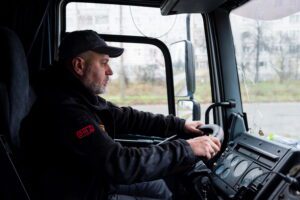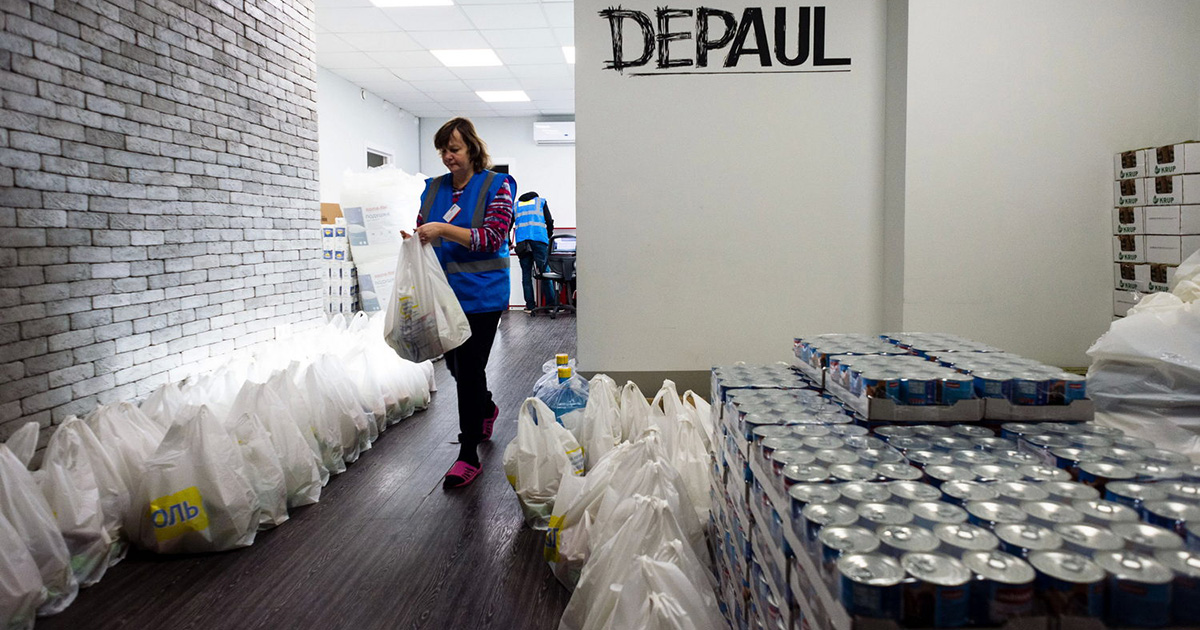February 24th was supposed to be like any other day. Then suddenly, for millions of Ukrainians, their world collapsed.
“February 24th is a date I will remember for the rest of my life. You don’t know what to do except to run.”
For 17 years, Depaul has been a lifeline for thousands of people experiencing homelessness in Ukraine.
Being homeless in Ukraine does not just mean having no home – it can limit access to healthcare, social entitlements and cut you off from the community. From its early days working with street children in Kharkiv to recent years supporting single mothers, advocating for medical treatment, supporting prisoners upon their release and running shelters, the small but dedicated Depaul team in Ukraine have helped thousands find their voice and rebuild their lives.
In early February the mood started to change. Threats of invasion hung in the air, and the fear was palpable.
Suddenly, as millions of Ukrainians woke up on the February 24th, what seemed a worst-case scenario, a distant possibility, came true.
A Depaul Ukraine staff member recalls, “It’s a sound like we’ve only ever heard in films. It was impossible to describe the feeling – an animalistic fear, one that shakes you from the inside.”
The bombs rained down, the horror and bloodshed filled the streets. As millions fled, traffic snaked in day-long queues across Ukraine, as families scrambled for safety across the borders.
 The Depaul team was also on the road, but driving the opposite way. They were going back to the frontline. “We are here for those who cannot leave” says Father Vitaliy.
The Depaul team was also on the road, but driving the opposite way. They were going back to the frontline. “We are here for those who cannot leave” says Father Vitaliy.
And so began an extraordinary, heart-breaking and astonishing journey for the Depaul Ukraine team.
Depaul’s values are compassion, and action, not words. Within days, lorries were sourced, with Father Vitaliy at the wheel, driving days at a time. Depaul is not a traditional aid agency, but unlike so many others who could not access Ukraine, we were right there.
As funding and donations flooded in from donors, from St John’s Ambulance to the Vincentian brothers in Rome, the team drove truckloads of hospital bandages, tourniquets, antiseptics, food baskets, pasta and pomodoro to thousands sheltering across the country. An appeal for funds generated an unprecedented response.
Alongside the aid, it was the team’s friendship and warmth that people remember the most. A staff member who visited recalls, “It is not just the assistance people appreciate. The Depaul Ukraine team is with them: they stop and talk and listen and cry with people whose lives are shattered. This is not just an exchange of materials, but an exchange of humanity.”
A few weeks in, the generosity of our supporters continued to flow, and as crucial funding arrived from organisations including the DEC, fleets of lorries were secured, a warehouse in Slovakia becoming the centre of our response and what had started as a grassroots operation became a full-scale aid response.
Six months later, the team had distributed 1500 tons of aid. For a team that was previously supporting 8,500 people a year, the scale of need was unthinkable.
As the months rolled by, the situation became increasingly perilous. Fuel shortages, price hikes, indiscriminate shelling.
Time and again, the small team flexed as infrastructure around them was destroyed.
When roads were blocked the team used trains. When fuel ran out across the country, they found cyclists to go door-to door.
As winter set in, rain and snow brought new challenges. Attacks on power supplies, energy infrastructure and plunging temperatures left thousands freezing, with genuine worries about hyperthermia.
Father Vitaliy wrote: “Everyone here is worried about winter. Even if people don’t freeze to death, there are a lot of amputations, this is a very dangerous situation.”
Thanks to ongoing support, soon thousands of people, were receiving blankets, firewood and fuel. The team travelled across towns and villages repairing windows and buildings, in an attempt to shelter people from the cold.
As New Year came, the onslaught remained. Yet as Depaul ramped up its distributions– now delivering to 30,000 people every day – it became increasingly clear that there was another issue the team was encountering–the trauma of war. How would the millions of adults and children who have experienced the horrors of life under shelling be able to process what they had been through?
Soon teams of counsellors were recruited to offer one-to-one as well as group support, to help children in particular process what they have been through.
One mother says, “They helped them learn to accept this fear, to face this fear. Yes, the war has started but we need to face it and carry on. Little by little, my daughter started to go outside again. The psychologists still help us, and the children are always excited to see them. A year has nearly passed now, and kids are growing up in these basements, but there is hope here… and hope dies last, as they say. “
As we reach the grim one year milestone, we can reflect on what our team has achieved. We have delivered over 4000 tons of aid, but more than that, it is the courage, resilience, and compassion of the Depaul Ukraine team which continues to resonate through their activities. We thank everyone who has supported the team in their extraordinary efforts.
As Mark McGreevy, President of the Depaul Group writes “We are often asked how our staff, so impacted by the war themselves, and witness to unimaginable suffering every day, are able to keep going. The answer is simple. Their values. Values that see them put the needs of those less fortunate above their own, and a relentless determination to take action to help those who need it most. No one knows what the future holds, but one thing we do know, our commitment to the country and its people is unwavering.”
Source: https://int.depaulcharity.org/








Thanks for sharing this touching report/ write-up. Only God’s love can sustain you all. We praise God for helping you to achieve your goals.
God bless all Vincentians.
God bless and protect your team (De Paul Ukraine). Praying for you.